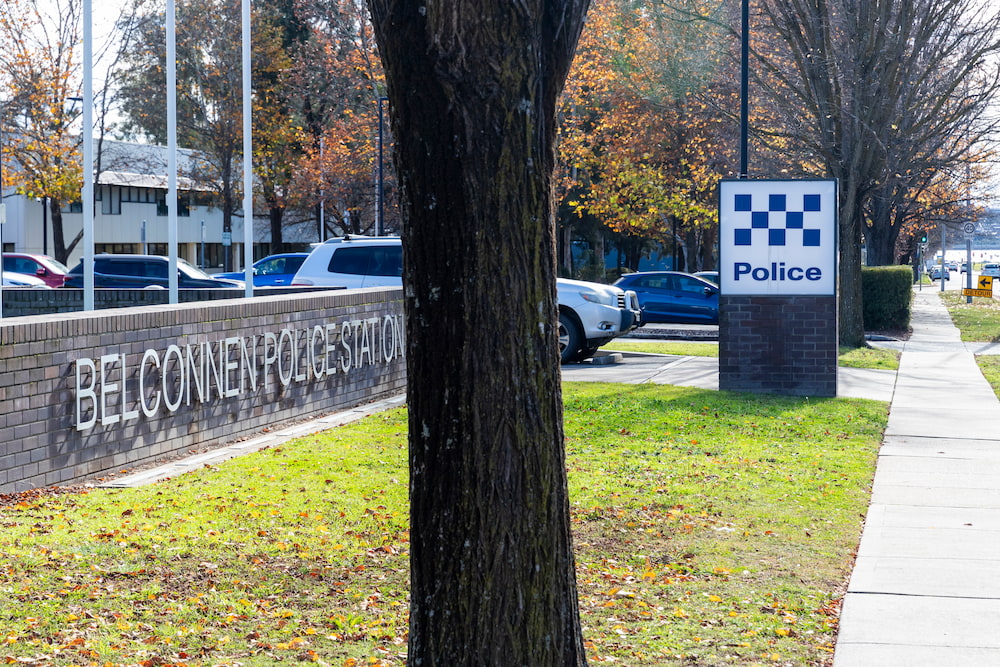Updated 23 September: ACT Policing has informed us that under caretaker arrangements, Superintendent Mick Calatzis (Canberra Liberals candidate) and Inspector Mark Richardson (Independents for Canberra candidate) no longer hold those roles in ACT Policing – they are members of the community running for election, not police.
In response to growing concerns that ACT Policing is critically under-resourced and short-staffed, several parties in next month’s election have pledged to increase funding, and are fielding candidates with law enforcement experience.
Those candidates – Mark Richardson (Independents for Canberra), ex-sergeant Jason Taylor (Belco Party), and Mick Calatzis (Canberra Liberals) – describe policing in the ACT as “frustrating”, and warn that the police force’s position is “parlous” and “untenable”.
For years, the ACT has consistently had the fewest police and the lowest funding for policing per capita in the country (RoGS), even though the number of police staff has increased over the last decade.
The Canberra Liberals attribute this to the government cutting $15 million for police from the budget in 2015. Opposition measures this term to investigate police numbers or to increase resourcing failed in the Legislative Assembly.
Both the police union, the Australian Federal Police Association (AFPA), and former ACT Chief Police Officer Neil Gaughan have warned that police officers are overextended and burning out.
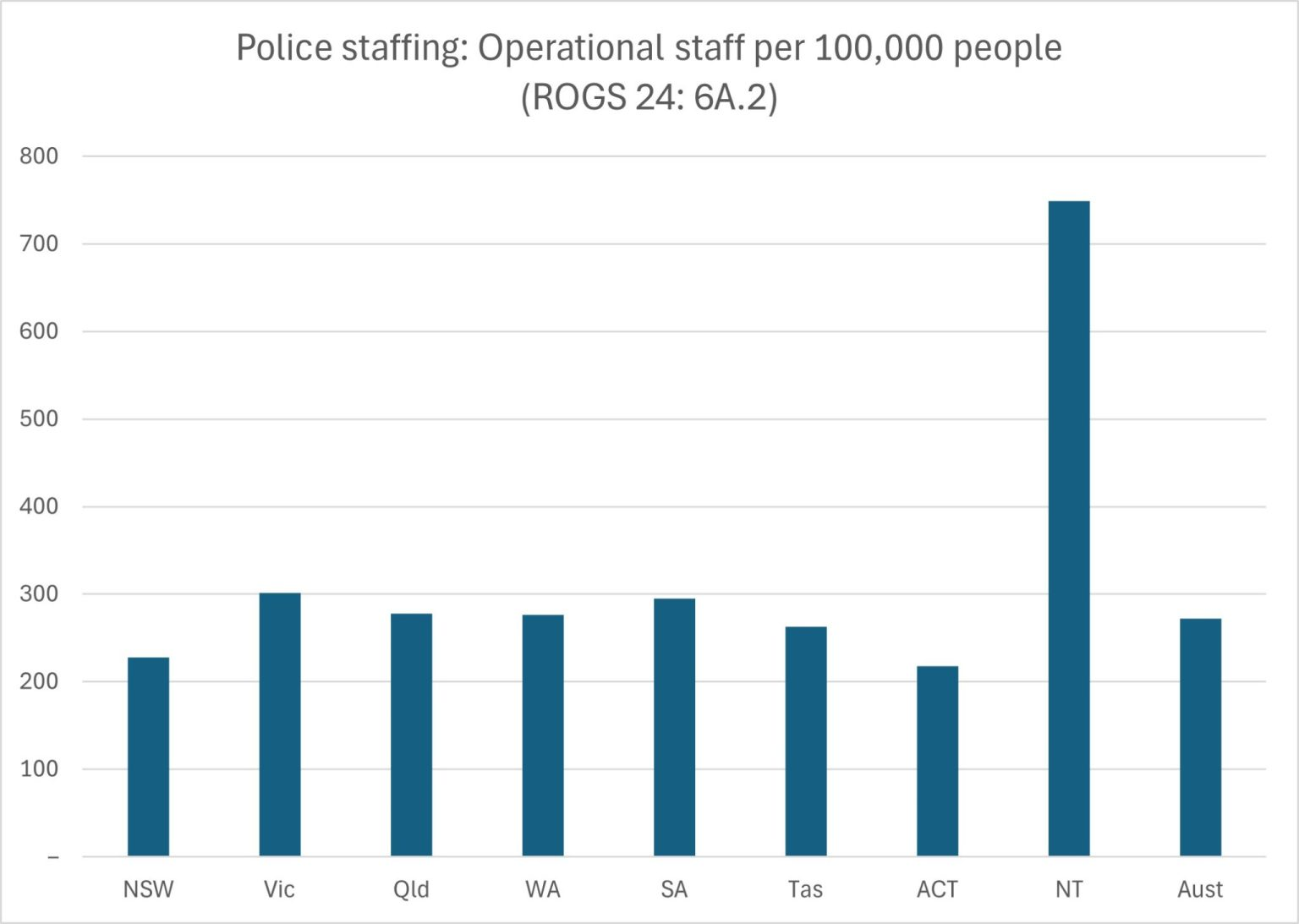
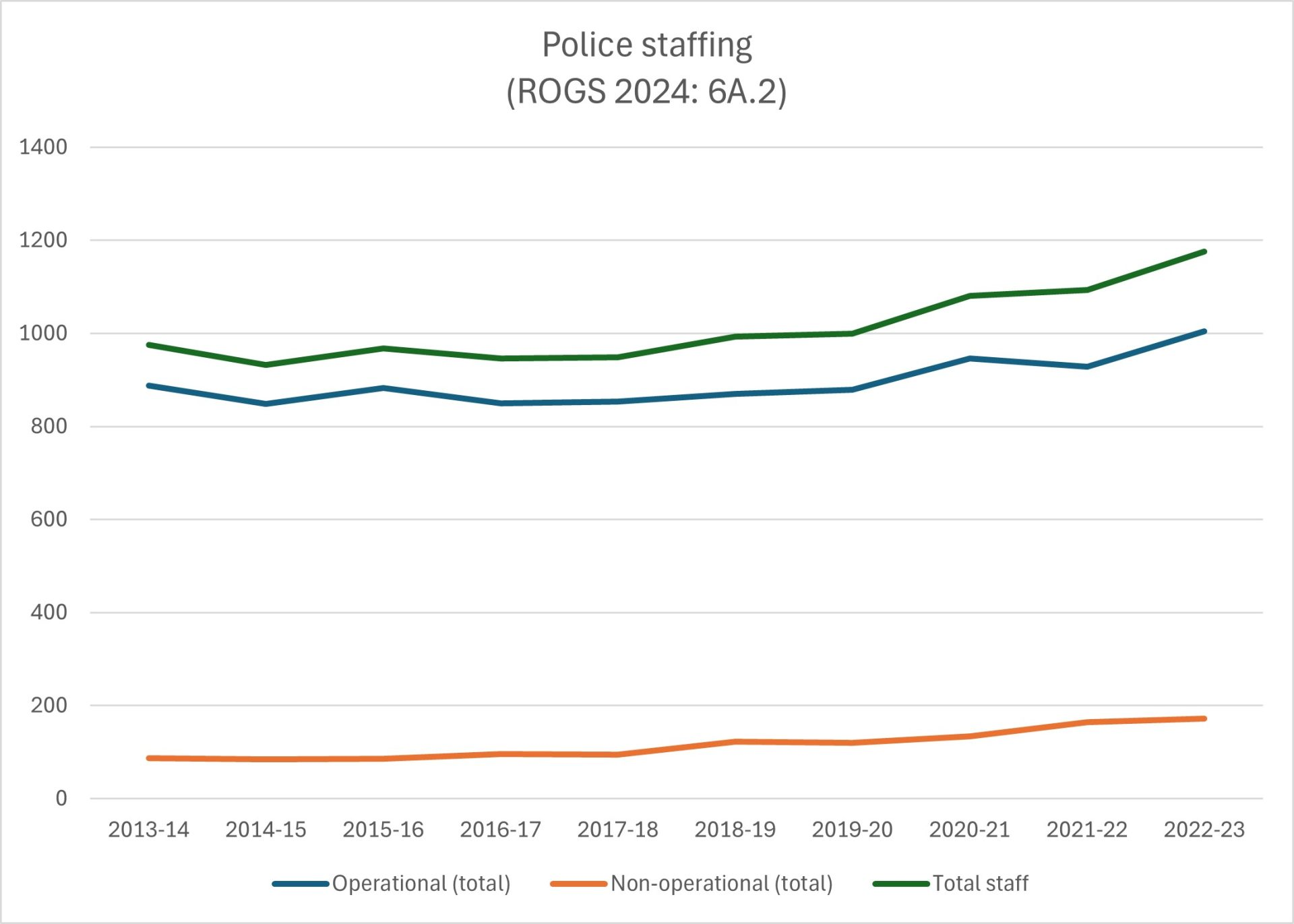
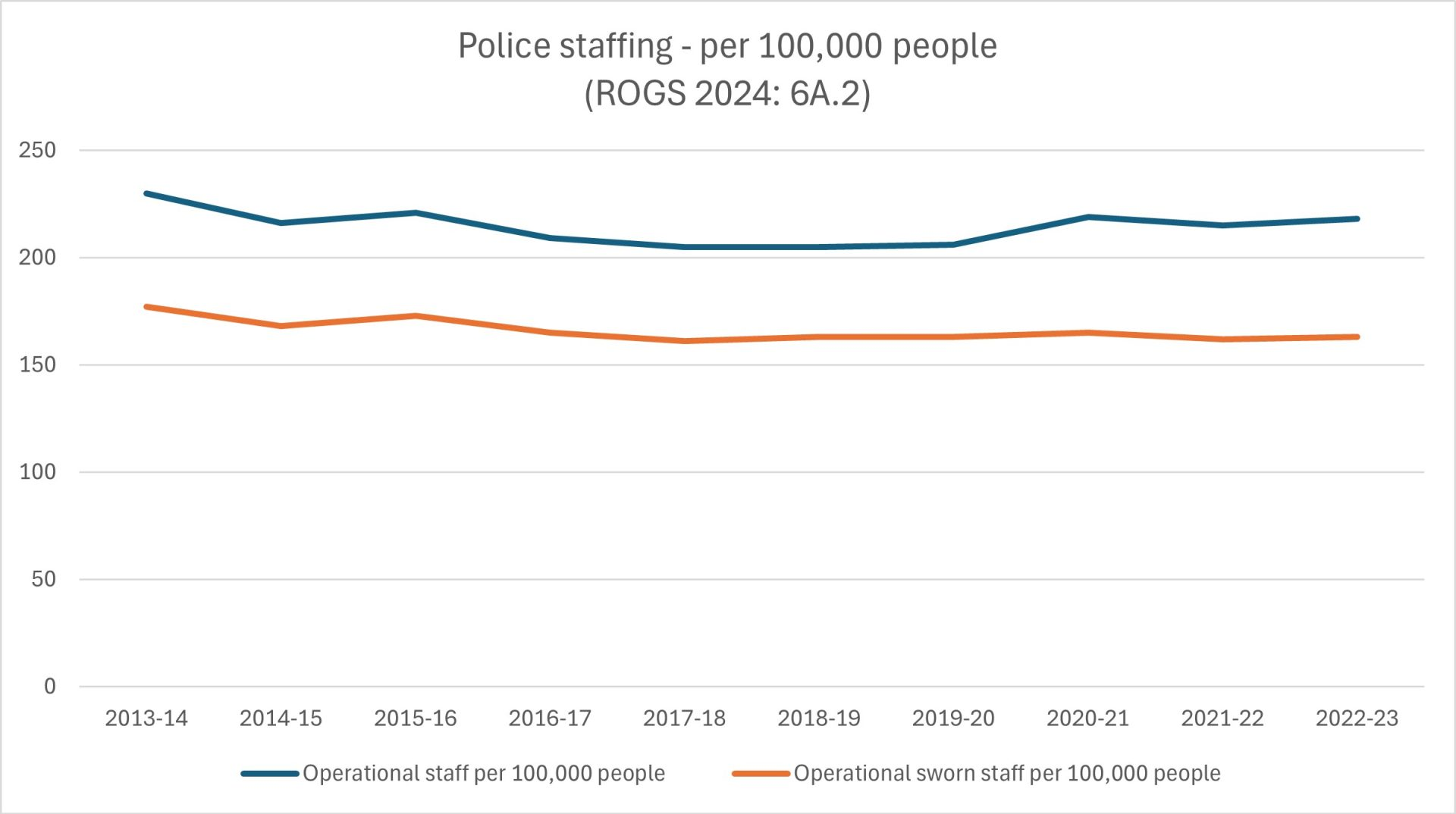
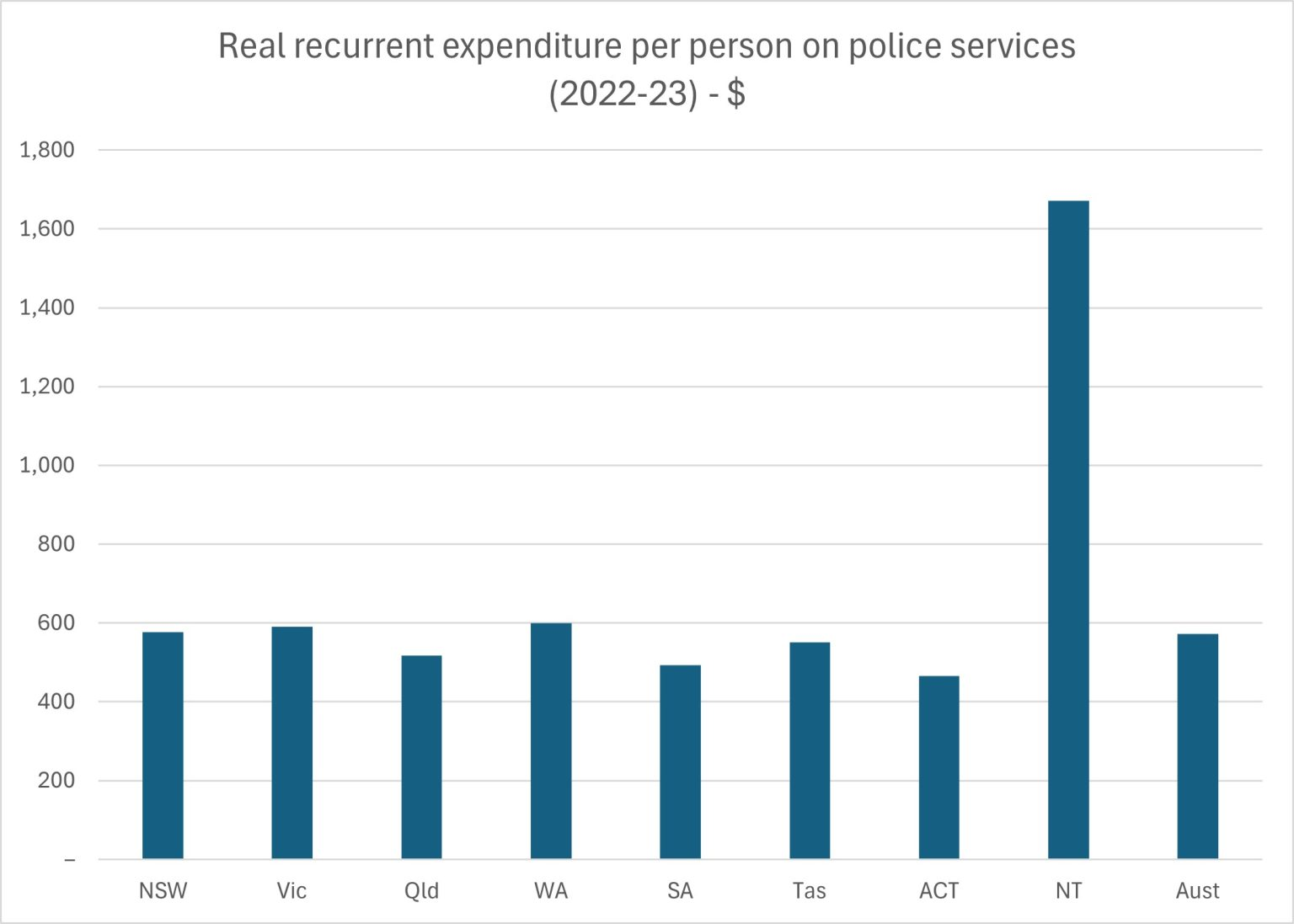
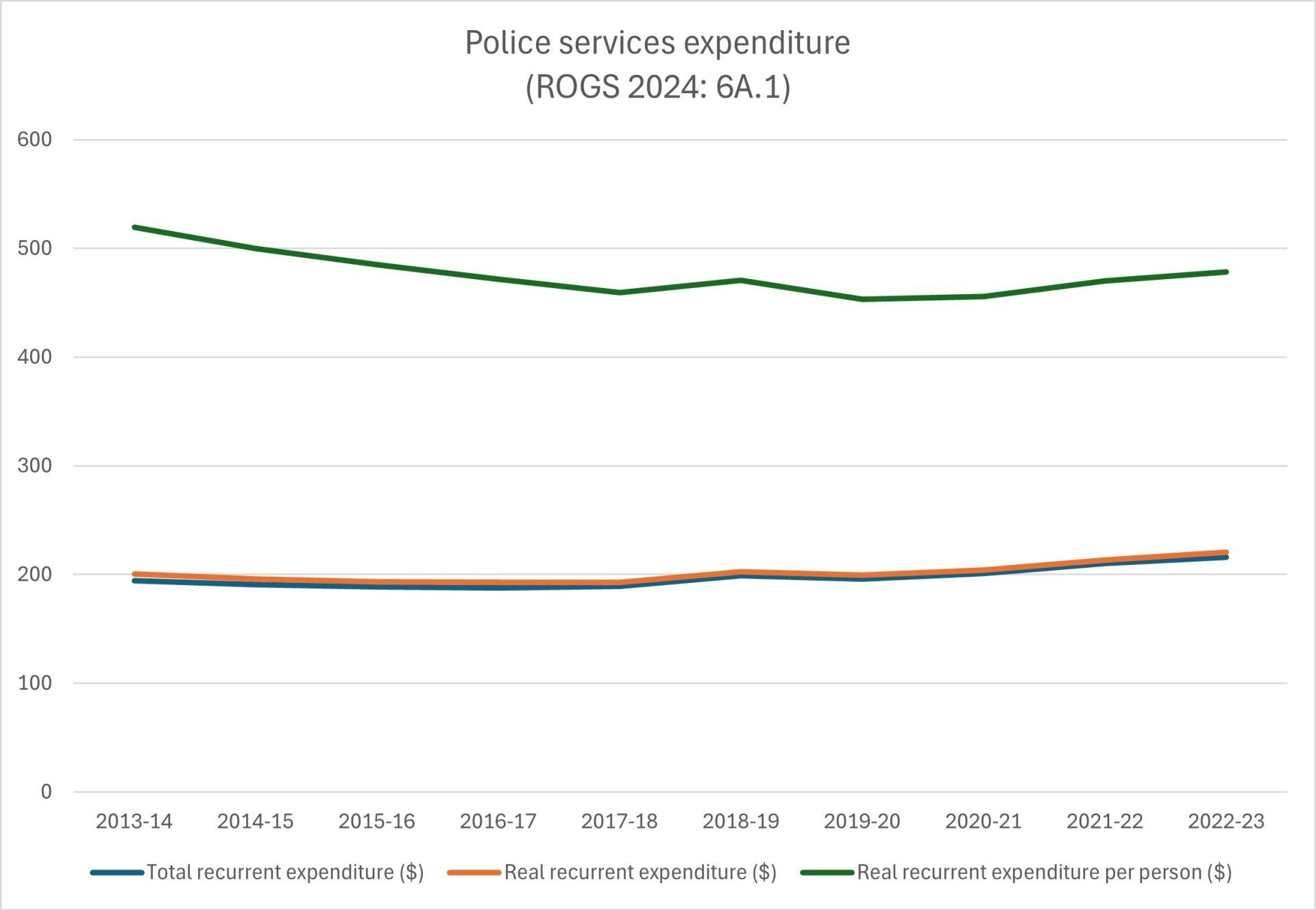
The ACT boasts some of the highest levels of perceived safety in the nation (ROGS 2024:6A.20). 90.1 per cent feel safe at home alone at night, and 93.6 per cent feel safe walking in their neighbourhood during the day – both the highest rates in the country. At night, 56.9 per cent feel safe walking alone, and 37.5 per cent feel safe on public transport, both above national averages and among the highest in Australia.
However, satisfaction with police services has declined over the last decade to 68.7 per cent – the second lowest in the country, below the national average (73.9 per cent).
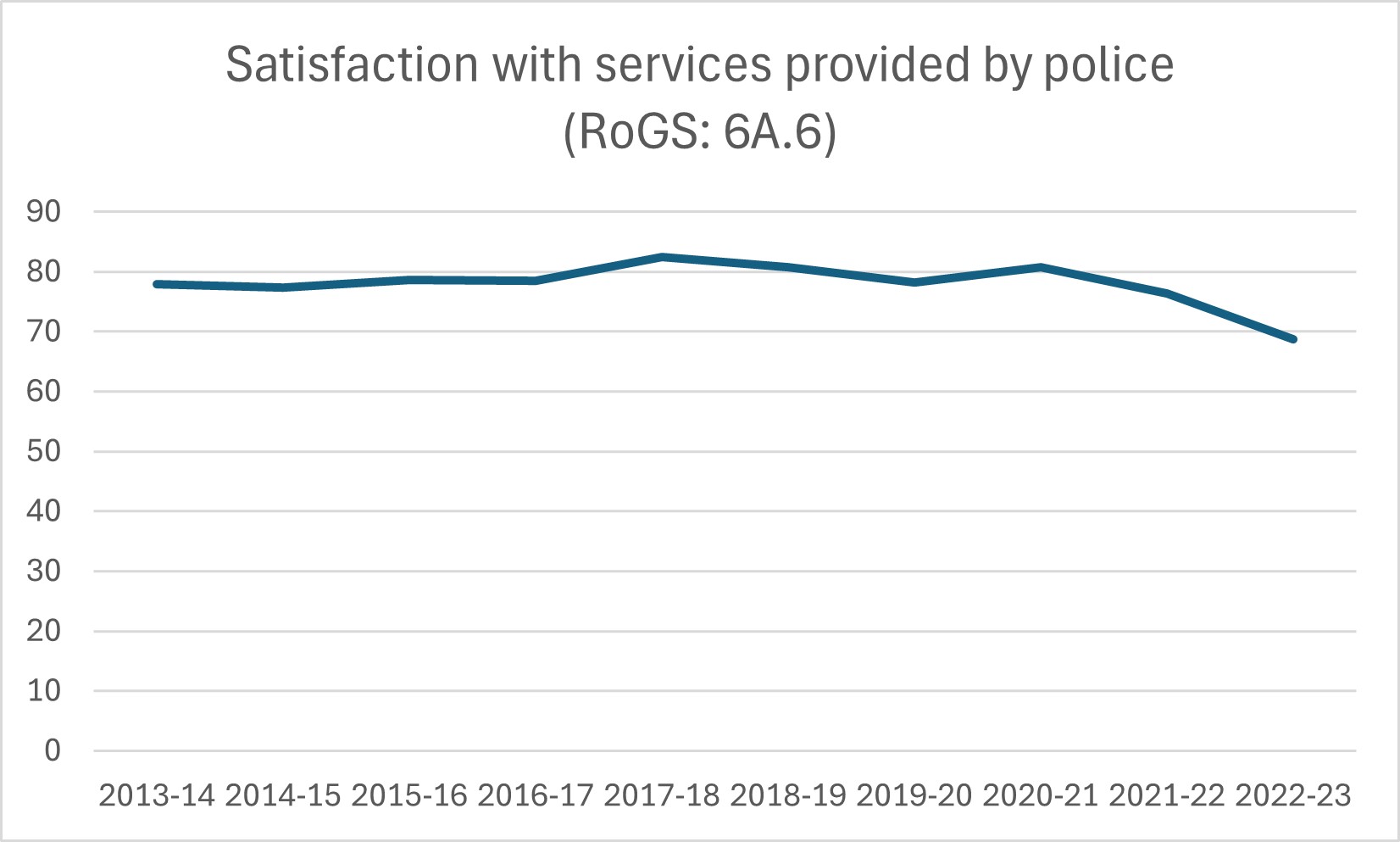
Investigation finalisation rates in the ACT are consistently lower than the national averages across various crime types (ROGS 2024:6A.10/11). For example, in 2022-23, police cleared only 33.8 per cent of armed robberies within 30 days (national average: 51.1 per cent), and 21.9 per cent of unarmed robberies (national average: 49.1 per cent).
The ACT had the lowest rates in the country for finalising unlawful entry (4 per cent vs. 18.2 per cent nationally), motor vehicle theft (6.5 per cent vs. 28.4 per cent), and other theft (4.5 per cent vs. 19.6 per cent) within 30 days.
Although ACT residents’ perceptions of police professionalism (81.3 per cent) and honesty (67.7 per cent) remain slightly above the national averages (80.4 per cent and 66.5 per cent respectively), the latest data reveals that these figures have reached their lowest point in a decade.
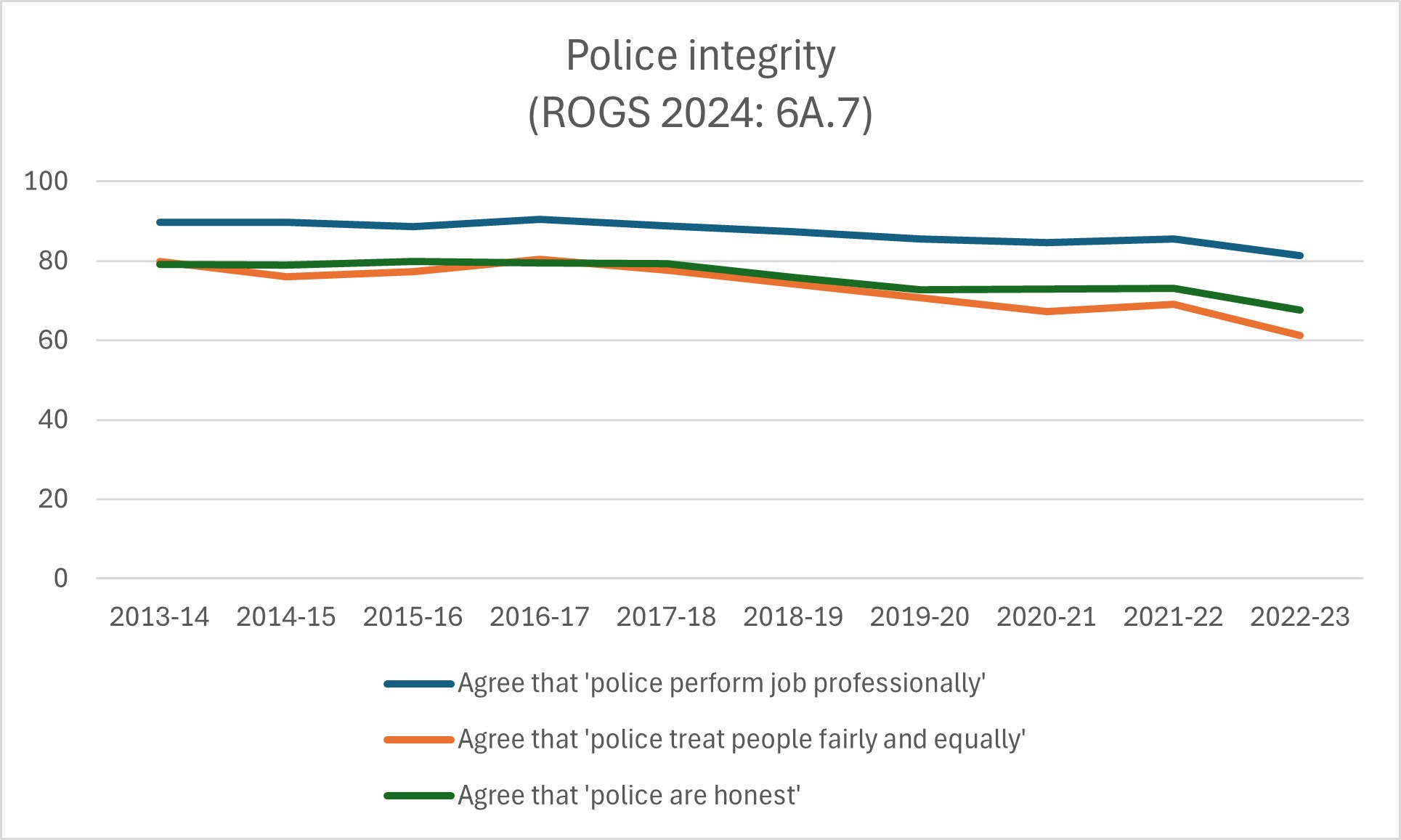
According to PwC’s independent review ACT Now (2023), ACT Policing is “operating below the capacity levels comparative to other jurisdictions, and will need increased capacity over the long-term to align with the growing population and demand in the ACT”. Otherwise, they warn, policing will become more reactive and response-based, rather than preventative, and “continued growth in demand will threaten to outstrip supply for community policing services in the ACT”.
In other words, the ACT is suffering from a shortage of police, and the problem could get worse.
“It’s not tenable. It’s a disgrace! It’s just not good enough!” Mr Calatzis has said.
Policing the ACT is ‘frustrating’, force is ‘in a parlous position’
“I can attest to how low the numbers in the ACT are,” said former police sergeant Jason Taylor, standing for the Belco Party.
“I was a patrol sergeant in Gungahlin a few years ago, and I was lucky to be able to put two cars (including myself) on the road,” Mr Taylor continued. “I would regularly be attending priority one incidents on my own, with my backup being the Belconnen sergeant. I regularly speak to many of my former colleagues, and they assure me that nothing has changed, apart from the population skyrocketing.
“When I started in general duties in 2007, we had the numbers to regularly have five-plus cars on the road. … We were able to devote the time to properly provide a community policing service, in particular respond to all incidents in a timely manner and engage with the community. This is not occurring now, unfortunately.”
The ACT Government, however, maintains that the ACT cannot be compared to other jurisdictions, because Canberra is a small city, and because of ACT Policing’s unique model: it partners with the Australian Federal Police, allowing it to draw on specialist capabilities more readily than other states. ACT Policing is flexible and can reallocate resources to address priorities such as peaks in type of crime more easily than larger, dispersed states can, the government said.
However, Mr Richardson, who has been in charge of ACT road policing, describes policing as “a frustrating experience”, due to lenient court outcomes, ongoing issues with repeat offending, and stations that are not fit for purpose and which have been neglected for many years.
Case in point: the Gungahlin police station temporarily closed earlier this year due to lead and diesel contamination, while the City police station flooded.
Mr Taylor agrees. “The low numbers, along with the dilapidated condition of much of ACT Policing’s current facilities, as well as the apparent lack of a plan from the government (outside of vague timelines and the odd mention of the at least decade old Master Accommodation Plan), mean that ACT Policing is in a perilous position,” he said.
“The government doesn’t need any more reviews to tell it needs more police, that three of its police stations aren’t fit for purpose, and the building that is utilised as its policing headquarters has long since passed its use-by date. It needs to take urgent action to futureproof its policing service. If it doesn’t, the community will ultimately pay a high price for this neglect.”
Government’s historic investment in police recruitment
ACT Labor has promised to build a police station in Molonglo, as have the Canberra Liberals: the fast-growing district has to rely on the station at Woden.
“A police station is not only about capability,” Mr Calatzis has said. “A police station provides comfort and safety assurance in the community 24/7, 365. It’s like the bright beam of a lighthouse on a point at night.”
Last year, the government made “the largest single investment in policing in ACT Government history”: $107 million to recruit 126 police officers over five years, “the equivalent of an additional recruit course each year”.
The recruitment plan is on schedule, a spokesperson says: new police officers are “already policing Canberra’s streets”.
But Mr Taylor says this investment is inadequate.
“The additional funding the government has committed to one 25-member recruit class per year for the next five years is insufficient,” he said. “Assuming all recruits that begin the course pass (which is no easy feat), then that is a maximum of 125 members over five years. That won’t cover the attrition rate.”
Other parties have made more ambitious commitments. The Canberra Liberals promised last month that they would recruit 200 additional police (74 on top of the 126 Labor has already budgeted), bringing the ACT into line with NSW.
“Whilst the Labor-Greens government continues to neglect our frontline police officers, the Canberra Liberals understand the basic needs of our community, and have long fought for more police officers in the ACT, along with providing the resources they need,” shadow police minister James Milligan said.
“A Canberra Liberals government will continue to work with the police and the AFPA to ensure they are given the resources they need to keep Canberrans safe.”
The Belco Party believes that even this figure is not enough. The ACT Now review called for 550 additional police officers in the ACT – 250 urgently, and 300 more as the population grows. Mr Taylor said this shortfall must be addressed immediately, by increasing ACT Policing’s full-time equivalent positions.
Mr Richardson said: “There is clearly a need for more police officers in the ACT, but there is no magic number of police that will be a cure-all for the ACT. Issues around retention of officers need to be addressed. The AFP are the lowest-paid police in Australia. Other jurisdictions are offering incentives and higher pay. (This is not unique to policing, as the health sector is having the same issues.”)
ACT Policing faces competition both from other jurisdictions and from the broader AFP (which all ACT Policing members belong to), as members can easily transfer to other roles, Mr Taylor explained.
Mr Calatzis has said that many ACT police officers cannot “even afford to live in the ACT, as it’s too expensive. Many of your police want to live in Canberra, but reside in NSW, as it’s more affordable and safer for them.”
The Belco Party suggests the government offer financial incentives to retain experienced officers and to attract them to ACT Policing. Those incentives could include extending financial concessions (rates, car registration, energy costs) to police officers and other frontline workers. Mr Taylor says his former colleagues working in the AFP would seek to join ACT Policing if such incentives were in place.
However, simply recruiting new officers is not enough, Mr Taylor argues, as ACT Policing has the least experienced workforce in the country: 48 per cent of its members are on probation. He recommends that the next purchase agreement include a requirement that at least 15 to 18 per cent of officers (excluding sergeants and higher ranks) have a minimum of six years’ experience.
Should we increase the number of police?
Bill Stefaniak, co-convenor of the Belco Party and former Attorney-General, argues that an increased police presence would deter crime and ensure better safety.
“If you have more police, a lot of people won’t get arrested, because they won’t commit crimes, because they’ll see police on the beat,” Mr Stefaniak said. “It’s a well-known adage that if you see cops patrolling around, walking around shopping centres, that, in itself, is a deterrent, which will put off would-be criminals.”
In the First Assembly (1989–91), Mr Stefaniak introduced ‘move-on’ powers to stop “young blokes full of piss and bad manners” from getting into more trouble. Police could warn them: ‘Go away, fellows, we’re going to have arrest you if you don’t go. Go away before you do something silly, like smash a window or belt someone.’
“It keeps especially young people out of trouble and a record that otherwise they’d end up with for assault or malicious damage. Good preventative policing.”
ACT Greens MLA Andrew Braddock, on the other hand, claims that increasing police would be counterproductive.
“When responding to a crime, it’s not enough to simply increase the number of police on the ground,” Mr Braddock said on TikTok last year. “You need a multidisciplinary approach. You need to be able to provide housing, social workers, to help address those social and economic determinants of crime.
“If you simply increase the number of police, you actually get to a situation which is called ‘over-policing’, where they’re finding more crime and persecuting people for that, without actually addressing the causes of those crimes, which breaks down the relationship between the community and the police, and creates a further problem. That’s why we need to work at addressing the root causes of crime, and not simply going for a ‘more boots on the ground’ solution.”
The AFPA called on Mr Braddock to retract his statement: “Suggesting that more police members on the streets of Canberra to protect citizens would result in ‘over-policing’ and persecuting people is wildly inaccurate and offensive.”
Mr Braddock has stuck to his guns.
“I have never stated ACT is over-policed, instead highlighted we need more health and social services to reduce demand on our police force,” Mr Braddock said.
“While there is increasing demand for ACT Police services, we know that 40 per cent of callouts are mental health-related. So, while we need police to respond to public safety risks, we can reduce demand on their services by investing directly in mental health services, so people are less likely to engage in harmful behaviours.”
Other parties, however, have criticised Mr Braddock’s comments, arguing that more police are necessary to maintain public safety.
“No, additional police don’t create additional crime,” Mick Gentleman (ACT Labor), minister for police and crime prevention, said. “Additional police enable better responses to the reporting of crime, and act as a deterrent to help prevent crime. The ACT Policing’s Police Service Model is focused on proactive strategies to prevent crime.”
Mr Richardson said that Mr Braddock’s claims were not in line with the position of any political party in the ACT, and wanted to know what Attorney-General and ACT Greens leader Shane Rattenbury had said in response to his MLA’s statement.
“Police enforce legislation; governments address socio-economic issues,” Mr Richardson said. “Perhaps ‘finding more crime’ means the government has failed to address socio-economic issues. The ACT Government has not kept funding for the community services sector in line with population growth, and police numbers in the ACT are the lowest per population in the country. Maybe the ACT Government has failed on both fronts?”
Jason Taylor said that Mr Braddock’s claims were flawed and disingenuous.
“Yes, ‘over-policing’ does exist in other parts of the world, but not in Australia, and certainly not in the ACT.
“‘Over-policing’ only exists if you have a properly resourced police service, that devotes the bulk of its resources to investigating crimes and arresting people. This is not the case with ACT Policing, this country’s most under-resourced police service.
“Resourcing a police service in the manner that this government does ACT Policing, means that the only thing they can do is respond to calls for service. (You can’t over police the population when you are too busy playing ‘whack-a-mole’ with ‘000’ calls.)
“Teams that do preventative patrol, offender management, diversion, rehabilitation, problem-oriented policing, family violence intervention, and other innovative and progressive policing methods become a luxury that is the first to be turned off when there aren’t enough officers to go around.
“The biggest irony of the current government’s under-resourcing of ACT Policing, thus keeping police numbers down, is it creates precisely the kind of police service that Mr Braddock doesn’t want to see, and is a barrier to the kind of policing he and his Greens colleagues wish for.”
Mr Stefaniak said Mr Braddock’s claim was ludicrous: “It’s just typical crazy Greens nonsense to say ‘More police, you’re going to have more people arrested’. Duh! Good – if they’re committing offences.
“I actually don’t think the Greens like police: it’s [an] undergraduate [mentality]. The police are the ones breaking up demonstrations. It’s juvenile, it’s puerile.”
Mr Braddock has raised concerns that multicultural communities could be hesitant or not confident to approach police, after a Zimbabwean man recently accused police of racial profiling after they arrested him for trespassing in his own home. Police later spoke to African community representatives.
“Canberrans have expressed they are concerned that some police display prejudice to particular groups of people in our diverse community,” Mr Braddock said. “This significantly erodes trust and engagement with our police force, which can lead to people not calling the police when there is a public safety risk. This is why we can’t simply increase numbers alone, and need more social and health services so people are supported to make safer and healthier choices.”
‘Canberra’s wellbeing depends upon the thankless and vital work of the police’
But policing itself is a social service, advocates say.
“Police officers are out in the community, and they get a front-row seat to how society is functioning,” Mr Richardson said. “They see what is working and what isn’t working. They are in contact with victims of crime, offenders, business owners, other emergency services, and community service workers.”
Mr Gentleman – who served for 11 years in Protective Services, now part of the AFP – agrees.
“Police are an integral and respected part of our community, and have good insights into community issues,” the minister said.
“The public often doesn’t see the volume of work that members of ACT Policing undertake every day to assist the most vulnerable in our community. ACT Policing work extends far beyond the traditional scope of policing. From community outreach and engagement programs to initiatives that support mental health and wellbeing, ACT Policing is deeply involved in the fabric of our society.
“ACT Policing play a critical role in our community, and we know the wellbeing of our city is dependent upon the often thankless and vital work they do. The ACT Labor Government will continue to build on our strong foundation of enhancing community safety and advancing social justice, through ensuring ACT Policing are ready to respond to incidents and the evolving needs of the ACT community.”
That experience in community service, Mr Taylor argues, would make himself, or Mr Calatzis or Mr Richardson, good politicians.
“Coppers tend to be very sensible and measured people who are committed to serving their community as best they can. I believe that these types of qualities will be beneficial to a member of the Legislative Assembly. If you look around other parliaments in Australia at the local, state/territory and federal level, there are many former police officers amongst their ranks. It’s about time we had some here in the ACT, as we haven’t seen a copper in the Legislative Assembly since [independent] Dave Rugendyke, which was nearly 25 years ago!”

